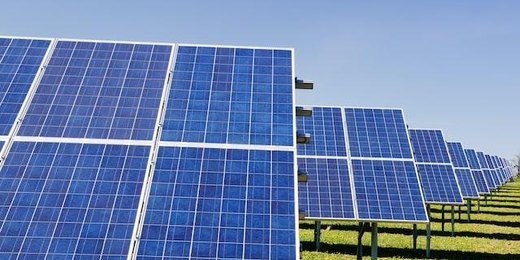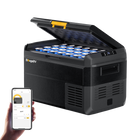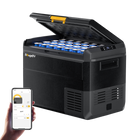What Does an Inverter Do, And How Does It Help Your Solar System?

Solar systems have become more popular now than ever, with millions of people hunting for a way to be kinder to the environment. Anyone who purchases a solar system should consider buying an inverter. However, many don’t understand what a power inverter is in the world. What does it do? How will it benefit your solar system?
If you’re interested in learning more about an inverter and how it helps your solar system, you’ve come to the right place. Read on to learn more about what this device does, how it works, the various types of inverters, and other valuable information. The more you know, the easier it will be to take advantage of one for your solar system.
- What Is An RV Inverter?
- How Does the RV Inverter Work?
- What Are the Types Of Inverters?
- What Equipment Can Solar Inverters Be Used to Run?
- Can Multiple Inverters Be Run at The Same Time?
- Precautions For Using Inverters
- BougeRV's Inverters
- Conclusion
What Is an Inverter?
An inverter is a quality tool that completes a simple process yet has a complex interior. This item regulates the frequency of electrical currents when they drift inside appliances. It regulates and controls the power moving inside, ensuring nothing goes wrong during this process.
Inverter systems possess the inverter themselves, a rectifier, and a variable frequency drive. The inverter is inside the VFD, and the rectifier sits inside the inverter, shifting DC power to AC for appliance use. This system works together to ensure you have access to the energy you need.
Once the power runs through this system, it transforms into AC power. AC power is what your home or RV runs on, from the smallest TV to the largest stove. An inverter is a necessity to get energy from solar panels to the devices that need their offerings.
Now that you know what an inverter is, how does it work? What goes on inside this system to allow conversion to occur?
How Does an Inverter Work?
Inverters are simple devices that seem complicated. The processes inside their system are intricate, taking in DC and moving it to AC. This energy will then power appliances and gadgets inside your home, right from your solar panels.
The inverter completes this process by moving the direction of the DC back and forth at a high speed. Once this transition occurs enough times, the DC changes to AC. It's a unique and exciting process for your home.
You understand how an inverter works, but what are the types of inverters on the market? What can you invest in for your solar system?
What Are the Types Of Inverters?
There is more than one type of inverter on the market. Before investing in one, it’s helpful to know your options.
There are three types of inverters:
- Sine wave inverters
- Square wave inverters
- Modified sine wave inverters
These will bring energy from your solar system to the appliances in your home.
The most expensive variety is the sine wave inverter, and the least is the square wave option. The sine wave is ideal if you want to power intense devices, while the square wave will work best for the basics. The sine is also more expensive than the square. It’s up to you to determine the best choice for your life.
What Equipment Can Solar Inverters Be Used to Run?

Solar inverters are practical tools. There are many items they will bring power to in a home.
Here are a few examples of items inverters can run:
- Hospital equipment
- Televisions
- Fridges
- Radio signals
They are versatile sources of energy for your home.
No matter what you need to run in your home, an inverter is an invaluable addition. It will ensure the excess energy moves from one location to another without issue.
Now that you know about what a solar inverter can run, can you use multiple? Is it possible to push more than one inverter at once?
Can Multiple Inverters Be Run at The Same Time?
Although it might seem like a good idea to hook up multiple inverters at once, it isn’t a good idea or a practical one for your needs. It’s possible to connect them, but it will take time and energy you might not have to complete the process.
If you’re interested in connecting parallel inverters, speak to a professional. They will provide a quote to complete the process and get you on your way as soon as possible.
It isn’t the best idea to run multiple inverters at once. Next, let’s dive into a few additional precautions when using inverters.
Precautions For Using Inverters
It is critical to take care when using a converter. They work with electrical currents, and you don’t want to stick your hand in the wrong place or attach an incorrect component to the system. We have a few precautions to consider when using inverters throughout your solar system.
Consider these precautions when using inverters:
- Don’t connect your inverter to high-load appliances, as it’s possible for this action to overload the system
- Never touch wires and other energy sources with your bare hands
- Ensure you pick the right size inverter for your system
- Check your equipment at least once a month to ensure everything is in quality condition
- Keep standard and insulated wiring to prevent fires
These will keep you safe and ensure you get the most from your inverters.
Inverters aren’t complicated, but it’s still critical to be careful when working around them. You never know what can happen if you are ignorant around strong electric currents. It’s always better to be safe than sorry.
With these tips in mind, it’s time to select an inverter. We have a suggestion if you aren’t sure where to look for this product.
BougeRV's Inverters
If you are searching for an inverter, we recommend the BougeRV inverter. This product isn’t too big or too small, and it’s capable of holding an extensive amount of power. We at BougeRV want nothing less than to help you achieve your best with our products.
The 2000W 12V Pure Sine Wave Inverter is made to work with you. It’s the ideal size to attach to your solar system, equipped to convert the power from your panels into energy your appliances will used.
There are many features inside this tool. It offers stable power to protect and extend the life of your appliances, Bluetooth to keep an eye on your tools as they use this power, LED indicator warnings, and more. It’s ready to provide power and keep you up-to-date on everything that is happening.
This inverter measures 16.1 x 9.8 x 4.7 inches and weighs 14.3 pounds. You can invest in it for $450. It is a solid choice that won’t break the bank or your back.
Conclusion
Inverters are an excellent addition to your solar system. They convert DC power to an AC system, providing additional energy for your appliances to work with as they run. Solar panels will remove the power from the system and put it into tools to ensure you take advantage of the limitless solar energy.
We hope this information was helpful! We at BougeRV are prepared to help you with all your energy needs for your solar panels. We are a professional team ready to assist and get your home on the right track. Our team has experience in power stations, outdoor appliances, roof racks, and many additional specialties for your convenience.



























































































































































































